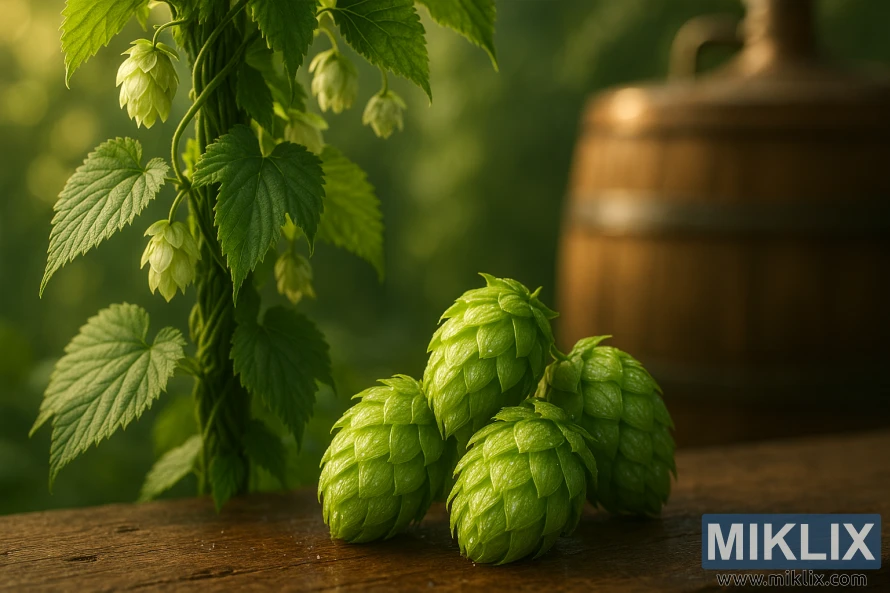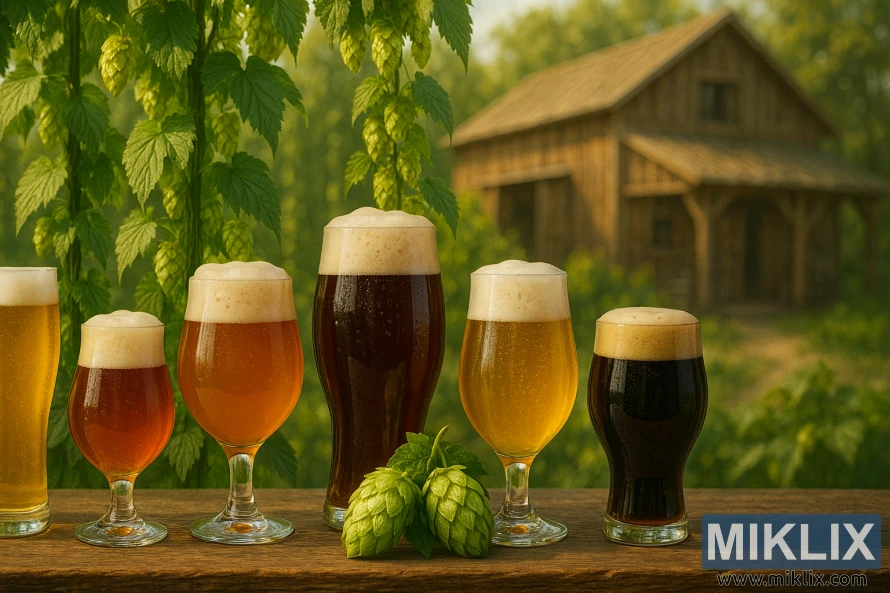Hops in Beer Brewing: Agnus
Published: August 12, 2025 at 6:25:29 AM UTC
Beer brewing is an art that requires a variety of ingredients, with hop varieties being key. Agnus hops are notable for their unique characteristics. They play a significant role in defining the flavor and character of the final product. Agnus hops come from the Czech Republic and are known for their high alpha acid content, around 10%. This makes them perfect for brewers aiming to add bitterness. They do so without overpowering the other flavors in the beer.

Key Takeaways
- Agnus hops are a bittering hop variety from the Czech Republic.
- They have a high alpha acid content, around 10%.
- Suitable for various beer styles that require a balanced bitterness.
- Can be used to create complex flavor profiles.
- Ideal for brewers seeking to add depth to their beers.
What Are Agnus Hops?
Developed from a mix of renowned hop varieties, Agnus hops offer a distinct flavor profile. They have captured the attention of brewers worldwide. Agnus hops were bred from a mix of Bor, Fuggles, Northern Brewer, Saaz, and Sladek varieties. This blend combines the best characteristics of these hops to create a unique bittering agent.
Agnus hops are mainly recognized for their bittering properties. They are an excellent choice for brewers looking to add depth to their beers. The flavor profile of Agnus hops is complex, contributing a subtle blend of herbal and spicy notes. These notes enhance the overall aroma of the beer.
The aroma of Agnus hops is another characteristic that makes them highly valued in the brewing community. Their unique scent adds a layer of complexity to the beer. This makes it more appealing to a wide range of palates.
In summary, Agnus hops are a versatile and valuable ingredient in beer brewing. They are known for their bittering capabilities, distinct flavor profile, and aromatic properties.
Chemical Composition and Properties
Grasping the chemical makeup of Agnus hops is key to crafting the perfect beer flavor and aroma. The composition of Agnus hops significantly influences the quality of the beer. It's a critical factor in the brewing process.
Agnus hops boast an alpha acid content between 9% and 14%. This high alpha acid content is ideal for beers needing a strong bitter taste. They also contain 4% to 6.5% beta acids, which enhance the hop chemistry and stability in brewing.
The blend of alpha and beta acids in Agnus hops enables brewers to create a well-rounded flavor. Alpha acids contribute to bitterness, while beta acids add depth and complexity. This balance is essential in brewing, shaping the beer's overall character.
By comprehending the chemical makeup and properties of Agnus hops, brewers can refine their techniques and recipes. This leads to a superior final product, elevating the brewing art.
Distinctive Characteristics of Agnus Hops
Brewers value Agnus hops for their unique flavor and aroma. These hops have a distinct taste and scent, differentiating them from other varieties. Their flavor notes include lavender, leather, and tobacco, making them versatile for various beer styles.
The aroma of Agnus hops is complex and highly valued. Used as bittering hops, they add a rich, nuanced flavor to beer. This makes them ideal for brewers aiming to enhance their beer's depth and complexity.
- Agnus hops offer a distinct flavor profile with notes of lavender and leather.
- Their complex aroma is highly valued in brewing applications.
- As bittering hops, they add a rich, nuanced flavor to beer.
Agnus hops are a favorite among brewers for their unique beer flavors. Understanding their flavor and aroma helps brewers use them effectively in their brewing.
Growing Conditions and Harvesting
Agnus hops are grown mainly in the Czech Republic, a prime location for their cultivation. To grow these hops, one must grasp the climate and soil conditions they need. This knowledge is essential for their development.
The Czech Republic's climate and soil are perfect for Agnus hop farming. The area's long summer days and moderate temperatures help the hops develop a strong flavor and aroma. This environment is key to their quality.
Harvesting Agnus hops usually happens in late summer to early fall. The timing depends on weather and the desired characteristics of the final product.
- Farmers watch the hops closely to find the best time to harvest.
- Using the right harvesting methods is vital to keep the hops' quality and flavor.
- The process involves cutting the hop cones, then drying them to remove moisture.
By mastering growing conditions and harvesting, brewers can achieve top-notch Agnus hops. This ensures their beers meet the highest standards of quality and flavor.
Brewing Applications and Techniques
Agnus hops stand out for their versatility in brewing. They are perfect for experimenting with various techniques. This allows brewers to craft beers with unique flavors and aromas.
These hops are prized for both bittering and aroma additions. Early in the boil, they add bitterness with their alpha acids. Their alpha acid content is suitable for a wide range of beer styles, ensuring balanced bitterness.
For aroma, Agnus hops are added later in the boil or during dry-hopping. This method preserves their delicate aromas. The choice between bittering, aroma, or both depends on the brewer's goals and the beer style.
Some common brewing techniques with Agnus hops include:
- Early boil additions for bittering
- Late boil additions for flavor and aroma
- Dry-hopping for enhanced aroma
- Hop blending to create complex flavor profiles
Breweries are exploring Agnus hops in various beer styles, from IPAs to lagers. Their adaptability and unique characteristics make them a versatile tool. Whether used alone or blended, Agnus hops enable brewers to craft a wide range of beers.
Understanding Agnus hops' brewing applications opens up new possibilities. Brewers can create complex and flavorful beers that appeal to diverse tastes and preferences.
Beer Styles Best Suited for Agnus Hops
Some beer styles are more compatible with Agnus hops than others. The unique flavor and aroma of Agnus hops make them versatile for brewers. They can enhance various beer styles.
Agnus hops are ideal for popular styles like IPA, lager, and ale. Their distinct qualities improve the brewing process. They also elevate the quality of the final product.
- IPA: Agnus hops complement the hoppy flavor of IPAs, adding refined bitterness.
- Lager: The crisp taste of lagers is enhanced by Agnus hops, adding subtle complexity.
- Ale: Ales benefit from Agnus hops' aromatic properties, enriching the flavor experience.
Understanding Agnus hops' interaction with different beer styles helps brewers create unique, delicious beers. Whether brewing an IPA, lager, or ale, Agnus hops can be a valuable addition. They showcase the hops' full range of possibilities.

Optimal Storage and Handling
To preserve Agnus hops' unique characteristics, proper storage and handling are key. These practices are essential for maintaining quality and flavor. They ensure the hops remain in top condition for brewing.
Here are some best practices for storing Agnus hops:
- Store hops in a cool, dry environment, away from direct sunlight and moisture.
- Use airtight containers or packaging to prevent exposure to air, which can cause degradation.
- Keep hops away from strong-smelling substances, as they can absorb odors easily.
Handling Agnus hops requires care to prevent damage and preserve their brewing quality. Key considerations include:
- Minimize handling to reduce the risk of physical damage to the hops.
- Use clean equipment and handling practices to prevent contamination.
- Monitor storage conditions regularly to ensure they remain within optimal ranges.
By following these guidelines, brewers can ensure their Agnus hops stay in optimal condition. This is vital for brewing a variety of beer styles. Proper storage and handling are critical components of the brewing process. They directly impact the final quality of the beer.
Brewing supplies, including storage containers and handling equipment, should be chosen with care. They must complement the storage and handling of Agnus hops. Investing in high-quality brewing supplies can help maintain the integrity of the hops and, by extension, the beer.
Substituting Agnus Hops in Recipes
Substituting Agnus hops requires understanding their unique characteristics and finding comparable hop varieties. Agnus hops are known for their high alpha acid content and distinctive flavor profile. This makes them a popular choice for various beer styles.
When Agnus hops are not available, brewers can consider substitutes like Magnum and Target hops. These hops share similar characteristics. The key to successful substitution lies in understanding brewing calculations and recipe formulation.
- Alpha acid content: Agnus hops have a high alpha acid content, so substitutes should have similar bittering.
- Flavor and aroma profile: Agnus hops contribute a unique flavor and aroma to beers. Substitutes should match these characteristics as closely as possible.
- Recipe formulation: Adjusting the recipe to accommodate the substitute hops may be necessary. This is to achieve the desired flavor and bitterness.
Some suitable substitutes for Agnus hops include:
- Magnum hops: Known for their high alpha acid content and clean bitterness. They are a good substitute in terms of bittering.
- Target hops: These hops have a balanced alpha acid content. They contribute a pleasant flavor and aroma, making them suitable for a variety of beer styles.
- Other high-alpha acid hops: Depending on the specific requirements of the recipe, other high-alpha acid hops can be used as substitutes. This is provided their flavor and aroma profiles are considered.
When substituting Agnus hops, brewers should be aware of the impact on the final beer's characteristics. Adjust brewing calculations to achieve the desired outcomes. By understanding the properties of both Agnus hops and their substitutes, brewers can make informed decisions. This ensures the desired outcomes in their beer recipes.
Common Brewing Challenges
Agnus hops, while versatile, can present several brewing challenges that need to be addressed. Brewers may encounter issues such as inconsistent flavor and aroma, which can significantly impact the final product.
One of the primary brewing challenges associated with Agnus hops is the variability in their chemical composition. This variability can lead to inconsistent flavor and aroma profiles in the finished beer.
To mitigate these issues, brewers can take several steps:
- Ensure proper storage and handling of Agnus hops to preserve their quality and consistency.
- Monitor brewing conditions closely, as small variations in temperature, pH, or other factors can affect how the hops contribute to the beer's flavor and aroma.
- Experiment with different brewing techniques and recipes to find the optimal approach for Agnus hops.
By understanding these challenges and taking proactive steps to manage them, brewers can effectively utilize Agnus hops. This allows them to create high-quality beers with unique characteristics.

Commercial Examples Using Agnus Hops
Commercial breweries are now using Agnus hops to craft unique beer profiles. They've successfully added Agnus hops to their recipes, creating beers with complex and distinctive flavors.
Some notable examples include:
- Craft breweries are using Agnus hops in their pale ales and IPAs. They're taking advantage of the hop variety's bittering and flavor properties.
- Larger breweries are incorporating Agnus hops into their seasonal and specialty beers. This adds depth and character to their brews.
- Experimental breweries are exploring Agnus hop usage in various beer styles. They're experimenting with stouts to sour ales.
The adoption of Agnus hops shows the brewing industry's ongoing innovation. As more breweries experiment with Agnus hops, the possibilities for new and exciting beer styles expand.
By looking at how Agnus hops are used in commercial brewing, we gain insight into its versatility. We see its wide range of applications in different beer styles.
Exploring the Art of Hop Blending
Hop blending is a craft that requires a deep understanding of hop varieties and their unique characteristics. By combining different hops, brewers can create complex and balanced flavor profiles that elevate their beers to new heights. This art form involves carefully selecting hops to achieve the desired aroma, bitterness, and flavor.
When it comes to hop blending, brewers have a wide range of options to choose from. Each hop variety offers its own distinct flavor and aroma profile, allowing brewers to experiment and create unique beer recipes. Whether it's combining citrusy hops for a bright and refreshing beer or using earthy hops for a robust and complex flavor, the possibilities are endless.
One of the key aspects of hop blending is understanding the different hop varieties and their characteristics. Brewers need to familiarize themselves with the flavor and aroma profiles of various hops, such as citrusy hops like Cascade and Mosaic, floral hops like Saaz and Hallertau, and earthy hops like Chinook and Simcoe. By knowing the strengths and weaknesses of each hop variety, brewers can create harmonious blends that showcase the best qualities of each hop.
Recipe formulation plays a vital role in hop blending. Brewers need to carefully consider the hop varieties they choose and how they will interact with each other. The ratio of hops, the timing of hop additions, and the brewing techniques used can all impact the final flavor and aroma of the beer. Brewers must experiment and fine-tune their recipes to achieve the desired balance and complexity in their hop blends.
Through hop blending, brewers can unlock a world of flavors and create beers that are truly unique and memorable. By combining different hop varieties, brewers can create complex and balanced flavor profiles that showcase the full range of hop flavors and aromas. Whether it's a hop-forward IPA or a balanced pale ale, hop blending allows brewers to push the boundaries of traditional brewing techniques and create beers that stand out from the crowd.
As brewers continue to experiment with hop blending, we can expect to see even more innovative and exciting beers on the market. The art of hop blending is constantly evolving, with brewers pushing the boundaries of flavor and aroma in their creations. Whether you're a seasoned beer enthusiast or just starting your journey into the world of craft beer, hop blending is an exciting and ever-changing aspect of the brewing industry that is sure to captivate and inspire.
Impact on Final Beer Characteristics
Agnus hops significantly influence a beer's flavor, aroma, and bitterness. Their unique chemical makeup makes them essential in brewing. This allows brewers to create beers with unique profiles.
The flavor Agnus hops impart can vary, but they often bring a clean, crisp taste. This is ideal for beers where a subtle hop flavor is needed. In terms of aroma, Agnus hops add a complex layer, enriching the beer's sensory experience.
Bitterness is another key area where Agnus hops shine. The alpha acids in these hops contribute to the beer's bitterness. Brewers can adjust this to their liking, making Agnus hops a favorite among them.
- Agnus hops can enhance the beer's flavor profile.
- They contribute to a complex aroma.
- They allow for precise control over bitterness levels.
Incorporating Agnus hops into brewing gives brewers a powerful tool. It helps them achieve their desired beer characteristics. This makes Agnus hops a valuable component in the art of brewing.

Quality Assessment Methods
Evaluating Agnus hops quality is critical for achieving the perfect flavor and aroma in beer. Assessing hop quality involves several key factors. These include the alpha acid content, beta acid content, and the presence of essential oils.
To accurately assess hop quality, brewers can employ various testing methods. High-Performance Liquid Chromatography (HPLC) is a common approach. It allows for the precise measurement of alpha acids, beta acids, and other compounds.
- Visual inspection for signs of deterioration or contamination
- Moisture content analysis to ensure optimal drying
- Essential oil profiling to determine the presence of desired flavor and aroma compounds
By utilizing these testing and evaluation methods, brewers can ensure that their Agnus hops meet the required standards. This ultimately results in a higher quality beer.
Regular quality assessment also enables brewers to identify any issues with their hop supplies. This allows for adjustments to be made to the brewing process as needed.
Troubleshooting Common Issues
Troubleshooting is a critical skill for brewers working with Agnus hops. It helps overcome common problems. Agnus hops, like other varieties, can present challenges during brewing. Identifying these issues early is key to producing high-quality beer.
One common issue is inconsistent bitterness levels. This can stem from variations in hop storage, handling, or brewing techniques. To address this, brewers should store hops properly in a cool, dry environment. They should also standardize their brewing processes.
Another challenge is overpowering flavors or aromas. Agnus hops have distinct characteristics. If not balanced correctly, they can dominate the beer's flavor profile. Brewers can solve this by adjusting the amount of Agnus hops used. They can also blend them with other hop varieties for a balanced taste.
Hop-related issues can also arise from poor hop quality or contamination. Brewers should inspect their hops for any signs of deterioration or contamination before use. Regular cleaning and sanitizing of brewing equipment are also essential. This prevents any contamination that could affect the beer's quality.
To effectively troubleshoot, brewers should:
- Monitor brewing processes closely to identify any deviations from the norm.
- Keep detailed records of brewing practices and outcomes to track patterns or recurring issues.
- Be prepared to adjust recipes or brewing techniques based on the specific characteristics of their Agnus hops.
By adopting a proactive approach to troubleshooting, brewers can better manage these issues. This allows them to produce high-quality beers that showcase the unique qualities of these hops.
Future Trends in Agnus Hop Usage
The brewing industry is on the brink of a revolution, with Agnus hops at the forefront. Brewers are pushing the boundaries of flavor and technique, and Agnus hops are becoming a cornerstone in this innovation. They are key to crafting unique beers.
Agnus hops are being used in a wide range of beers, from traditional lagers to modern IPAs. Their distinct flavor and aroma make them a favorite among brewers. They offer a way to stand out in a crowded market.
- Increased adoption in craft brewing
- Experimentation with new brewing techniques to bring out the unique characteristics of Agnus hops
- Blending Agnus hops with other hop varieties to create complex flavor profiles
As the brewing industry evolves, Agnus hops will likely become even more central. Their versatility and unique traits make them a staple in many breweries. They are set to shape the future of beer flavors and aromas.
The future for Agnus hop usage is promising. Brewers and researchers are constantly finding new ways to use these hops. With the growing demand for innovative and quality beers, Agnus hops are well-equipped to meet this need.
Sustainability and Environmental Impact
Sustainable hop farming is essential for Agnus hop production's future. The brewing industry's growth raises concerns about hop farming and brewing's environmental impact. Factors like water usage, soil health, and energy consumption are critical for Agnus hop cultivation.
Practices that focus on sustainability can greatly reduce Agnus hop production's environmental footprint. Techniques like integrated pest management, crop rotation, and efficient irrigation systems are key. For example, many farms now use drip irrigation, which delivers water directly to the roots, cutting down on waste and energy needs.
Brewing practices also play a vital role in reducing environmental impact. Breweries are adopting sustainable methods such as renewable energy, water reduction, and recycling. Some even use spent hops to generate energy or create new products.
The advantages of sustainable hop farming and brewing are vast. They not only lessen environmental harm but also enhance hop and beer quality. Sustainable methods promote healthier soil, efficient water use, and lower carbon emissions.
To further reduce environmental impact, breweries and farmers are exploring new solutions. They are using organic farming, reducing packaging waste, and implementing energy-saving brewing techniques. These efforts ensure a sustainable future for Agnus hop production and the industry as a whole.
Conclusion
Agnus hops have become a key ingredient in beer brewing, adding unique flavors and aromas. They are suitable for various beer styles, from pale ales to complex lagers. This versatility makes them a valuable asset for brewers.
Using Agnus hops can significantly improve beer quality and uniqueness. Brewers need to understand the best growing conditions, harvesting, and storage methods. This knowledge helps maximize Agnus hops' full flavor and aroma.
The brewing industry's growth will likely see Agnus hops play an even bigger role. Their distinct properties and the demand for diverse beers make them essential. Agnus hops offer brewers a new dimension in creating innovative beer recipes.
Further Reading
If you enjoyed this post, you may also like these suggestions:
